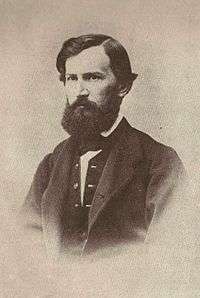Konstantin Ushinsky
Konstantin Dmitrievich Ushinsky (Russian: Константи́н Дми́триевич Уши́нский; Ukrainian: Костянтин Дмитрович Ушинський) (2 March [O.S. 19 February] 1823 – 3 January 1871 [O.S. 22 December]) was a Russian teacher and writer, credited as the founder of scientific pedagogy in Russia.[1][2][3]

Biography
Konstantin Ushinsky was born in Tula to a family of a retired officer.[4] Soon the family moved to Novhorod-Siverskyi (modern Ukraine) where Konstantin's father was appointed an uyezd judge.[5] In 1844 Ushinsky graduated from the Department of Law of Moscow University.[2][5] From 1846 to 1849 he was a professor at the Demidov Lyceum in Yaroslavl but was forced to leave the position because of his liberal views.[3][5]
The unemployed Ushinsky earned money by literary work for the magazines Sovremennik and Biblioteka dlya Chteniya. After a year and a half he managed to get a position as a minor bureaucrat in the Department for Foreign Religions. Ushinsky referred to his job at the time as "the most boring position possible."[5]
In 1854 Ushinsky became a teacher of Russian Literature and Law at the Gatchina Orphanage (Gatchinsky Sirotsky Institut). In 1855-1859 he became the Inspector at the same institution.[2] There was a lucky incident during his inspectorship: he discovered two sealed-off bookcases untouched for more than twenty years, which held the library of Pestalozzi's pupil Hugel. This discovery strongly influenced Ushinsky's interest in theoretical pedagogy.[5]
In 1859-1862 Ushinsky was the Inspector of the Smolny Institute for Noble Maidens in Saint-Petersburg, In 1860-1862 he also worked as the Chief Editor of the Journal of the Department of Education (Zhurnal Ministerstva Narodnago Obrazovaniya).[3] Following a conflict with the Department of Education, Ushinsky was forced to go abroad to study school organizations in Switzerland, Germany, France, Belgium and Italy (1862-1867). The position was perceived by many as an honorary exile.[5]
At the end of his life Ushinsky mostly acted as a writer and publicist. Together with Pirogov he may be considered as an author of the liberal reforms of the 1860s. Emancipated peasants needed schools, the schools needed teachers and textbooks. Ushinsky expended a lot of effort arguing the best way to organize teachers' seminaries. He also wrote children's textbooks for learning reading: Children's World (Detski mir), "the Russian equivalent of America's McGuffy Reader,"[6] and Native Word (Rodnoye slovo).[7] More than 10 million of Ushinsky's books, including 187 editions of Native Word, were printed before the October Revolution.[5]
Works
Ushinsky's magnum opus was his theoretical work The Human As a Subject of Education: Pedagogical Anthropology in three volumes, started in 1867.[5] According to Ushinsky, the subject of education is human, so it is impossible to achieve results in education without using the results of the "anthropological sciences": philosophy, political economy, history, literature, psychology, anatomy, physiology.[3] According to Ushinsky, "Pedagogical experience without science is equivalent to witchcraft in medicine."[5] Among Ushinsky's breakthroughs was the new "Analytic-Synthetic Phonetic Method" for learning reading and writing, which is still the main method used in Russian schools.[3]
Memorials
Educational institutions named after Konstantin Ushinski:
- South Ukrainian National Pedagogical University in Odessa, Ukraine
- Yaroslavl State Pedagogical University in Yaroslavl, Russia
- 1st Simferopol Gymnasium in Simferopol, Russia
References
- L.G. Guseva, "Konstantin Dmitrievich Ushinsky: The Founder of Scientific Pedagogy in the 19th Century Russia", History of Education & Children’s Literature, XIII, 1 (2018), pp. 479-491 (in English)
- Ushinsky article in Brockhaus and Efron Encyclopedic Dictionary (in Russian)
- Ushinsky article by Eduard Dneprov in Great Soviet Encyclopedia (in Russian)
- Konstantin Ushinsky Archived 2007-09-29 at the Wayback Machine (in Russian).
- The teacher of Russian teachers Archived 2007-01-27 at the Wayback Machine official site of Moscow University of Industry and Finance.
- Jeffrey Brooks, When Russia Learned to Read: Literacy and Popular Literature, 1861-1917 (Northwestern University Press, 2003: ISBN 0-8101-1897-1), p. 51.
- Konstantin Ushinsky on peoples.ru encyclopedia (in Russian)
External links
| Wikimedia Commons has media related to Konstantin Ushinsky. |
- Children Tales by Konstantin Ushiksny (in Russian)